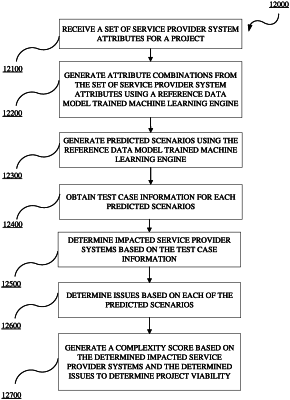| CPC G06F 11/3684 (2013.01) [G06F 11/3688 (2013.01); G06F 11/3692 (2013.01); G06F 18/214 (2023.01); G06N 20/00 (2019.01)] | 17 Claims |

|
1. An application lifecycle management system, comprising:
one or more databases; and
one or more processors connected to the one or more databases and to a memory storing instructions, wherein execution of the instructions by the one or more processors cause the one or more processors to:
implement supervised learning techniques to establish a predictive analysis engine, wherein the predictive analysis engine uses Multiclass Multilabel Classification artificial intelligence libraries and a reference data model to generate attribute combinations, generate predicted scenarios, determine issues and generate a complexity score;
receive a set of service provider system attributes for a project, wherein the set of service provider system attributes defines or is associated with specific features or functionality in a service provider system;
generate the attribute combinations from the set of service provider system attributes using the predictive analysis engine, wherein the predictive analysis engine is trained on the reference data model;
generate the predicted scenarios from the attribute combinations using the predictive analysis engine;
determine the issues based on the predicted scenarios; and
generate the complexity score based on at least the determined issues to determine project viability including with respect to hardware and software systems used in the service provider system,
wherein the reference data model includes test scenarios from the one or more databases, each test scenario associated with a test scenario attribute combination and wherein the test scenarios used in the reference data model provide regression testing for core functionality in the service provider system.
|